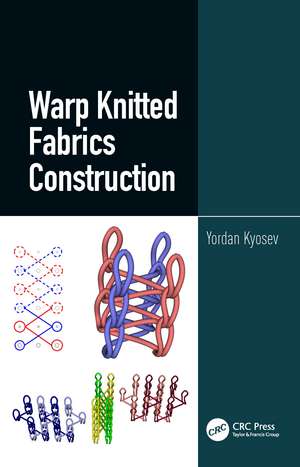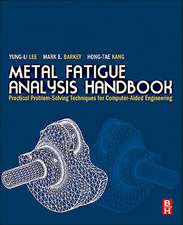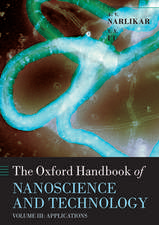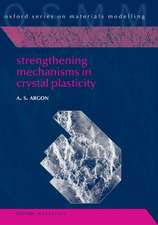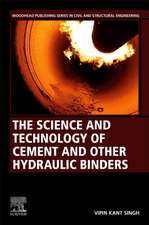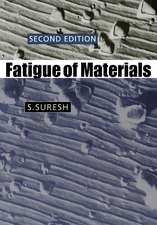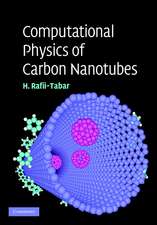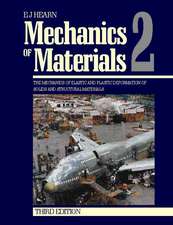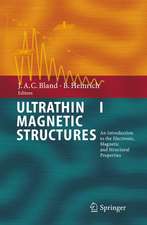Warp Knitted Fabrics Construction
Autor Yordan Kyoseven Limba Engleză Hardback – 15 aug 2019
Preț: 1279.33 lei
Preț vechi: 1560.15 lei
-18% Nou
Puncte Express: 1919
Preț estimativ în valută:
244.83€ • 254.66$ • 202.12£
244.83€ • 254.66$ • 202.12£
Carte tipărită la comandă
Livrare economică 14-28 aprilie
Preluare comenzi: 021 569.72.76
Specificații
ISBN-13: 9781498780162
ISBN-10: 1498780164
Pagini: 324
Ilustrații: 276 Illustrations, color
Dimensiuni: 156 x 234 x 23 mm
Greutate: 0.65 kg
Ediția:1
Editura: CRC Press
Colecția CRC Press
ISBN-10: 1498780164
Pagini: 324
Ilustrații: 276 Illustrations, color
Dimensiuni: 156 x 234 x 23 mm
Greutate: 0.65 kg
Ediția:1
Editura: CRC Press
Colecția CRC Press
Public țintă
Professional Practice & DevelopmentCuprins
Background. Short introduction in the warp knitting fabric production. Single needle bed machines. Single guide bar fabrics. Two bar fabrics (Full set threading). Two bar Fabrics (Part set threading). Three and four bar fabrics. Laid-in Fabrics. Cut Presser Fabrics and Knock-off Laps. Raschel Laces. Fall plate Fabrics. Double needle bed (Raschel) machines. Background information. Bar arrangements, types of bars. Two bar fabrics. Multiple bar fabrics. Spacer fabrics. Jacquard warp knitted structures. Fundamentals - process, guide arrangement, threading, codign. Single needle bed jacquard fabrics. Double needle bed jacquard fabrics. Engineering design of warp knitted structures. Geometrical models for yarn axis coordinates - state of the art, principles, limitations. Theoretical calculations for warp knitted structures - run-in per guide bar, specific weight after production and after shrinkage and stretch - theory, practical examples, comparison between the theoretical models calculated with TexMind Warp Knitting Editor and real samples. Modelling strategies for simulation of the mechanical behavior. Case studies of numerical investigation of the tensile and compression behavior. Quality insurance aspects - related yarn properties, fabric defects, fabric properties
Notă biografică
Yordan Kyosev holds M.Sc. degree in Technique and Technology of the Textile and Clothing (1996), M.Sc. degree in Applied Mathematics (2002), PhD in Textile machines (2002) (Technical University Sofia, Bulgaria). He habilitated in the area of Textile Technology in Technical University Chemnitz, Germany in 2018. Between 1996 and 2005 he was an assistant professor for Textile Technology at the Technical University Sofia, Bulgaria (design of textile and sewing machines, knitting technology and technical mechanics). After a research stay with Post-Doctoral Fellowship of the Alexander von Humboldt foundation at the Institut for Textiltechnik of RWTH Aachen University in 2005-2006, he became a Professor of Textile materials, textile technology and quality management (2006) at the Faculty of Textile and Clothing Technology, Niederrhein University of Applied Sciences, Germany. During 2019 he joints Technical University Dresden and take over the chair for assembling technology for textile materials. He developed the 3D module of the first industrial software for 3D visualisation of warp knitted fabrics for ALC Computertechnik (2006-2008). In 2011 he founded the soft-ware company TexMind (www.texmind.com), specialized in the development of algorithms for modelling of textile structures, software "Braider", "Braiding Machine Configurator" and "Warp Knitting Pattern Editor 3D", used for creating of the most Figures in the current book. Prof. Kyosev is an author of numerous publications on modelling of textile structures, braiding and knit-ting technology, fuzzy logic. Since 2018 he is an Editor-in-Chief of the Journal of Engineered Fibers and Fabrics.
Descriere
The aim of this book is to provide the background of the warp knitting patterning with a large amount of simulated 3D images of the structures, corresponding to the modern available tools. The pattern book will allow the readers to look at complex pattern with marked separated yarns with different colours to understand how they are bound while searching for relations between the architectures and their properties.
